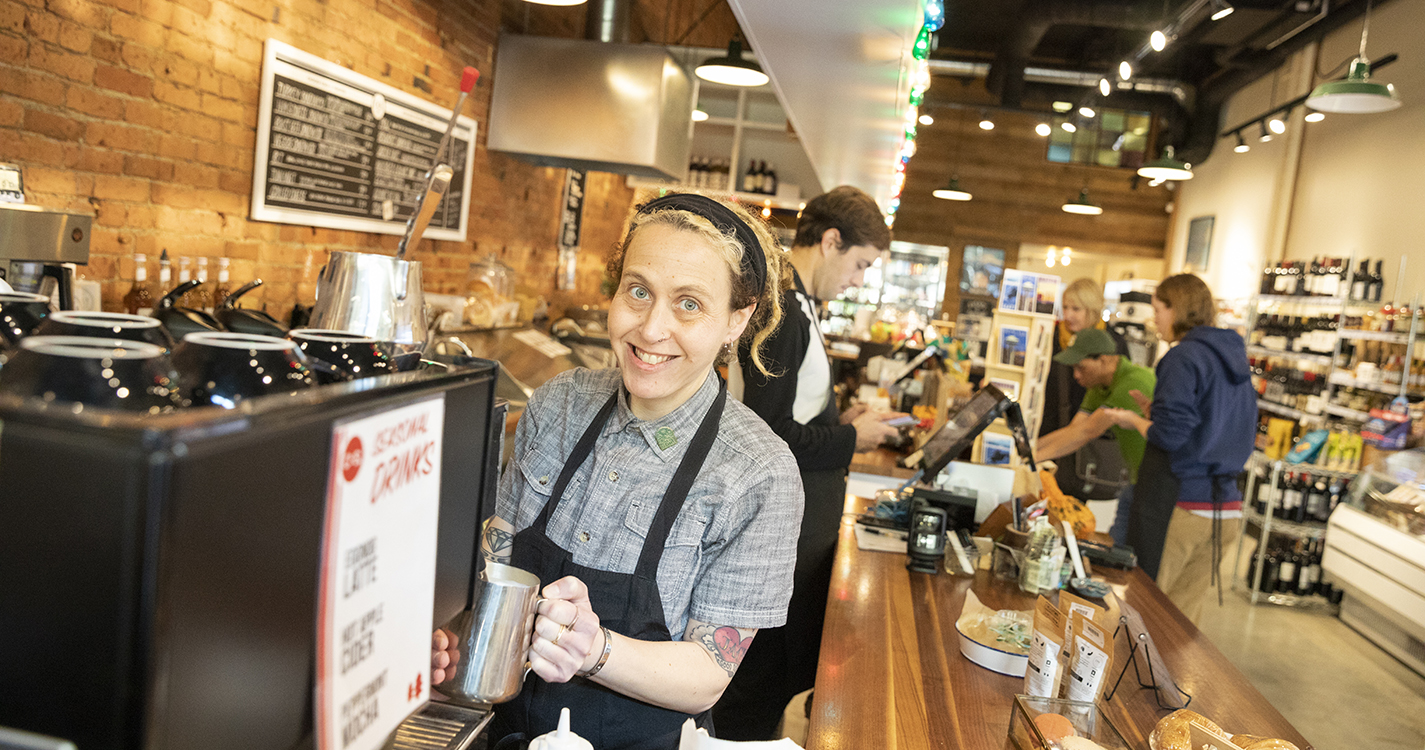A sense of place — the warm familiarity of being known and accepted — is an emotion Dani Cone ’98 holds dear.
It drove her to open Fuel Coffee in Seattle in 2005, launch High 5 Pie in 2008 and Cone & Steiner general stores in 2014. Her businesses have expanded in arguably the most competitive coffee city in America — to high-traffic spots downtown, neighborhoods teeming with students — as has her concept: people from all walks of life uniting over the basic comfort of food and drink.
Her success gained her national attention through Martha Stewart, the Food Network and Bon Appetit, and beyond speaking engagements like TedXSeattle, she has become one of the most recognizable small business owners in the city.
So years ago, when it came to finding the right college, she had to feel like she belonged. And Cone knew — the minute her parents dropped her off on campus, scared and anxious like so many others — that Willamette University was the right place for her.
“I felt very comfortable in a way I didn’t anticipate and couldn’t have even hoped for,” she said. “You can do whatever you want there — be in a big group or by yourself, study whatever subject — and the environment and community will support you.”
Finding identity through hard work
When Cone was a teenager, she worked at a deli in a Seattle suburb just as the coffee house culture began to boom.
Her goal was a business major, but at the time Willamette offered only business economics. The marketing principles and business law have been useful throughout her career, and she speaks in the language of economics on a daily basis. In the subject areas where she struggled, help and resources were available.
“I did extra horribly in econ stats,” she laughed, “but that hasn’t prevented me from owning and running multiple small businesses.”
For a few years, she also served coffee and ran open mic nights at The Bistro. When she wasn’t working, she was enjoying the ambiance — the furrowed brows of students deep in concentration, the sound of the espresso machine, the unexpected conversations that bubbled up between art and math students and most of all, the professors who regularly stopped by. In this world, status didn’t matter: Everyone was welcome.
For Cone, figuring out a career was easy — anyone can perform any job — but carving out an identity was hard. Willamette’s holistic approach to education, which allowed her to incorporate her interests in Spanish, English writing classes and environmental causes, helped her figure out who she wanted to be, she said.
“It was such an important and impactful time for someone like me, so unsure and uncertain, and four years at Willamette really gave me a strong inner foundation,” she said. “From there, I figured out what I wanted to do.”
Forging ahead with flexibility, awareness
At age 28, she opened Fuel Coffee, a sudden success that led to two more locations, one year after the next, and it all happened so quickly she didn’t have the finances to cover it. Then the Great Recession hit and she was in freefall.
Straddled with huge loans and responsible for more than 20 employees, she sought comfort in a go-to favorite and ate “crazy, shameless amounts of pie” in response and started a new business around that concept, High 5 Pie, to keep the lights on, she said. At the start of the pandemic, she felt a similar overall panic and uncertainty.
She’d been aggressively working on growth plans for Cone & Steiner, raising another round of capital from investors to support what she calls a “micromodel” — a self-serve kiosk version of the general store that lives in offices and other densely populated spaces.
As the business landscape has changed, she’s pausing on the idea for the foreseeable future, she said. But the lessons she learned in 2008 still apply: understand the environment but keep looking ahead.
“I do believe that the one big opportunity within this enormous dark cloud is the chance to rebuild and be better than what we were,” she said.
Business owners need to stay flexible and see what’s next, she said. The basic need for a brick and mortar place to break bread, share food and be greeted with a smile will always exist.
“To me it’s the most important thing in the world, and I just want to be part of creating these spaces,” she said.


